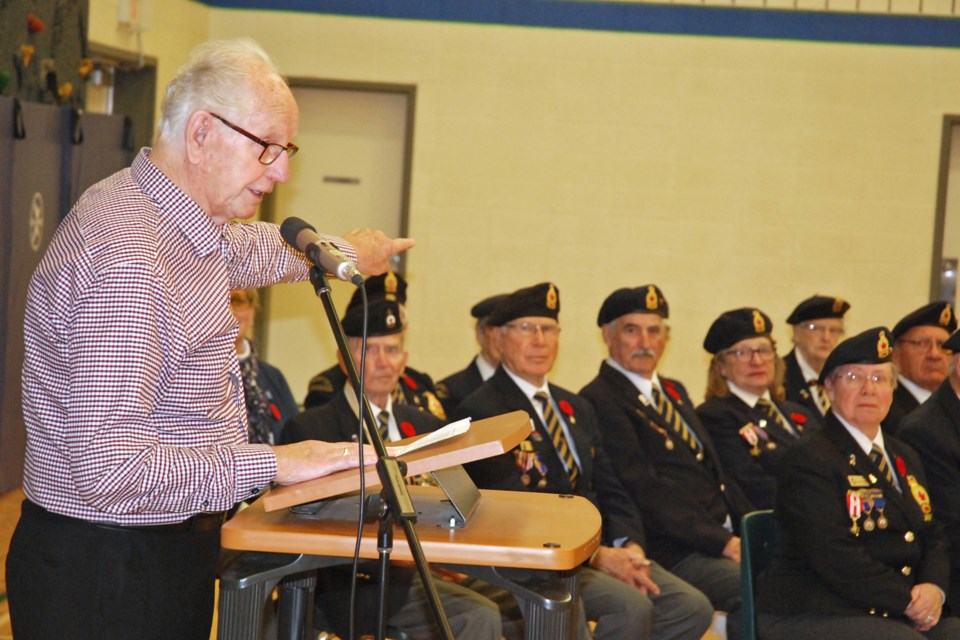More than 400 people who gathered at River Valley School for Sundre’s annual community Remembrance Day service heard a civilian survivor’s story about desperate times of scarcity during the Second World War.
Neil Vanderzwan, 86, who was just a little boy when the Germans invaded Holland, shared his experience on Monday, November 11 and expressed profound gratitude for the efforts and sacrifices made by Canadian soldiers who fought to dismantle the Nazi war machine.
“I lived there until I was about 21 years old, and then I came to Canada, thanks to those people sitting right there,” he said, pointing at Royal Canadian Legion Sundre Branch #223 members.
Now a resident at the Mountain View Seniors’ Housing lodge, Vanderzwan remembers when Germans marched into his hometown of Haarlem, located about 15 kilometres west of Amsterdan.
“The people that came into Holland in 1940 — our friends and neighbours, (or they) used to be at one time — came in and they told us what to do,” he said.
“And basically we had no other choice.”
During the ensuing “razzia” civilian raids, when occupying soldiers went into towns and cities to round up able-bodied men, Vanderzwan said his three older brothers were taken away.
“Two of them came back, one died in Germany,” he said.
After more than a year into the occupation, levels of scarcity grew so desperate that meat had become a memory and people were forced to eat whatever scraps they could find, including tulip bulbs, he said.
“There was definitely hunger,” he said.
“I tell you right now, that we had a wonderful cat — and after a couple of years of not having any meat, we had meat that day,” he said, briefly pausing.
“But the cat was never seen again, and that’s the truth.”
Still, people endured, and Vanderzwan remembers when the war clouds finally lifted. In early May 1945, in the days leading up to when victory in Europe was finally declared, he recalls a column of Allied tanks rolling into Haarlem from Amsterdam.
“I got on the top of a tank and rode with the army into the city of Haarlem,” he said.
“That was, for us, the liberation,” he added, reiterating his appreciation.
“That’s basically what I’m here for, is to give credit to all those people over and over again,” he said, adding he will for the rest of his life remain grateful.
Speaking next, Tim Kirby, the Sundre legion’s chaplain, asked those in attendance, “What is the greatest thing that you want to cherish and hold dear to you, today?”
Kirby spoke of grace, which he described as “the freedom to be who we are, do what we do, whatever and however we want.”
“The Germans were free to march into the countries around them and do what they did,” he said.
“And yet, the Canadian soldiers, military people, the army and the navy, and everyone involved, were free to go and liberate places like Holland.”
Kirby called the liberty to act against oppression the grace of God, who marched alongside everyone who fought for freedom.
“It’s what our RCMP do every day. Our fire departments, our EMS and the others who look after us,” he said.
“They choose to get up in the morning and do, because it’s their choice, their freedom.”
As a result of the sacrifices made many years ago and on to this day, he said Canadians enjoy the freedoms to travel wherever they want and do whatever work they want without fear of threat or reprisals.
The First World War ended more than a century ago, the Second World War grows dim in our collective memory, and the deployment of our soldiers around the world are also becoming memories, he said, adding we all too often forget their service.
“We walk out of this meeting and we go our life’s ways. The business of life takes over,” he said.
“But I leave you with that question, what is the greatest thing that you cherish today?”
He said that around the world, there are hundreds of millions of people who are to this day being persecuted, many of them enslaved, with more than 60 conflicts causing bloodshed.
“They’re vicious, and they’re killing and destroying people.”
The freedom we enjoy in Canada was granted “to us by those who went and died for us,” he said, adding tens of thousands of Canadians were killed overseas during the Second World War.
“And we’ll lose more yet.”
Members of the RCMP, he added, have also laid down their lives carrying out their duties in service to community and country to uphold the ideals our soldiers fought for.
“The freedom of speech, the freedom to own property, the freedom of education, the freedom to travel, the freedom to worship, the freedom to work and play, the freedom to do whatever you want, whenever you want, wherever you want,” he said.
“Soldiers have given us a great legacy.”
The chaplain also took a moment to announce his intention to step down as of Jan. 18.
“This is the last time that I will be speaking to you as the president and chaplain of the Royal Canadian Legion Sundre Branch 223,” he said.
The branch’s books, membership and poppy campaign, he added, are in very good shape.
“We have a good group of people in our leadership…and I know that those who follow will honour what has happened in the past.”
With what he described as dark clouds on the horizon, Kirby concluded his address with what he called a tribal blessing, urging everyone to be strong, courageous and full of wisdom.
“May you see the light shine bright in the darkness, and on your path of light, enjoy being alive, smiling in great humour.”
The service concluded following the ceremonial laying of wreaths, after which snacks and refreshments were served for an opportunity to socialize.



